It is a letter of recommendation written by your undergraduate professor, supervisor, mentor, manager, etc. that highlights your academic performance, personal qualities, capabilities, and accomplishments that make you a good fit for a particular graduate school or program.
These letters primarily serve one purpose, they are a form of peer-to-peer advice. They are required explicitly by an academic program and are usually sent directly to the graduate program faculty without the applicant seeing them. This means that the professor can provide the graduate program faculty with an assessment of your potential as a graduate student and a researcher from an objective perspective, helping them make an informed decision about accepting you into their program over the other qualified applicants.
It plays a significant role in helping you secure an admission offer. If you have any weak areas in your application
EXAMPLE
A slightly below-average GPA, a positive and detailed letter from your undergraduate supervisor can influence the admissions committee to consider you over other applicants.
This is why it is important to understand how to secure strong and impressive recommendations from competent recommenders.
Graduate School Recommendation Letter Examples
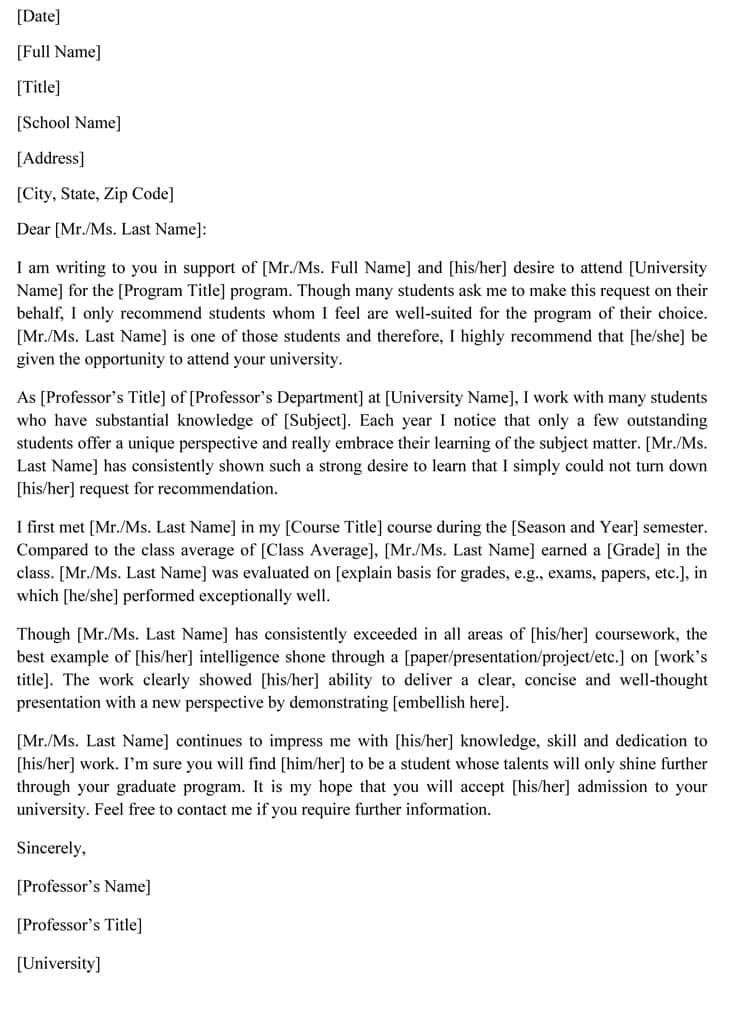

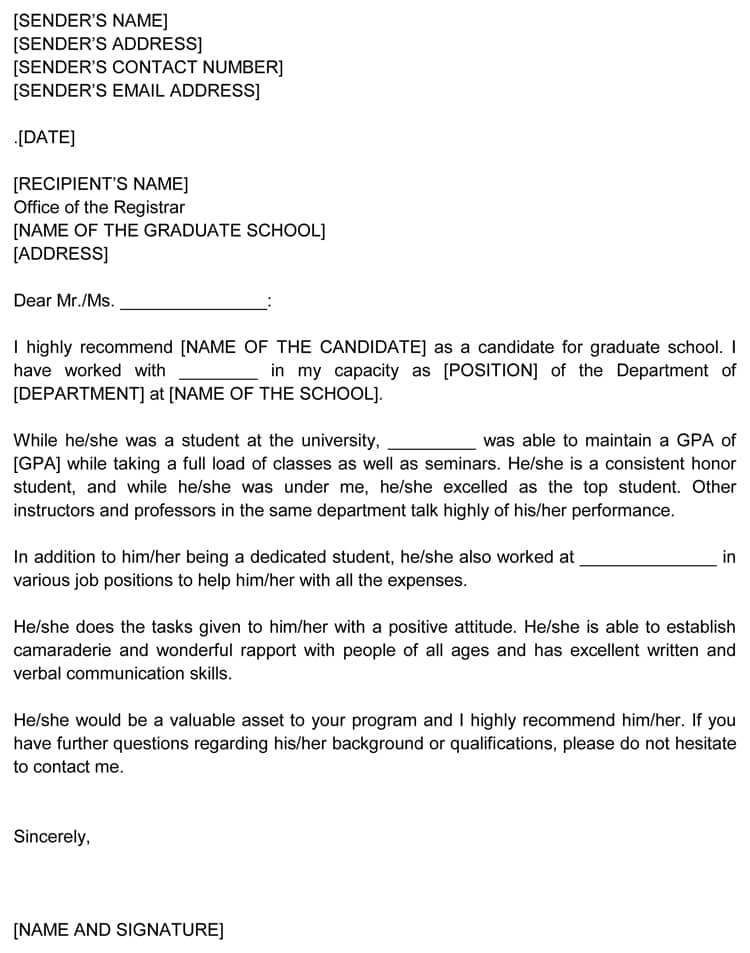
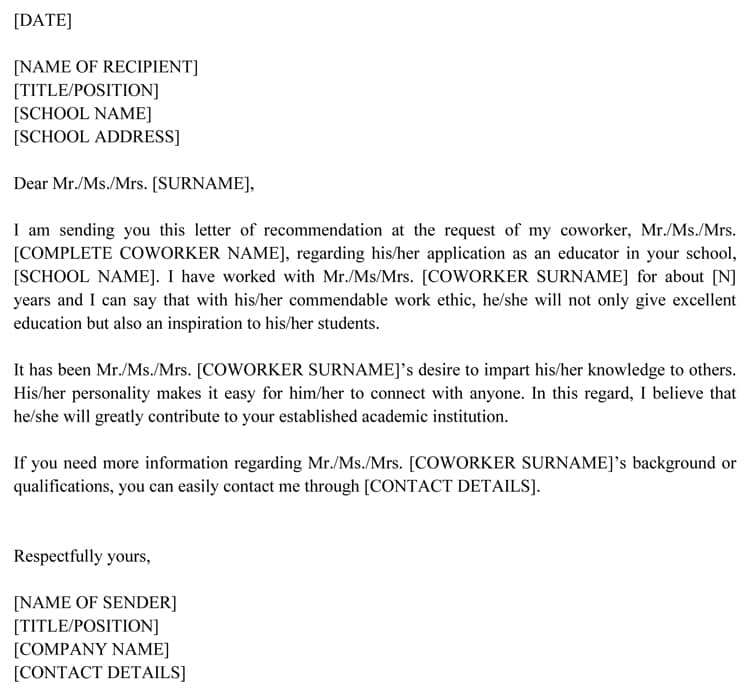
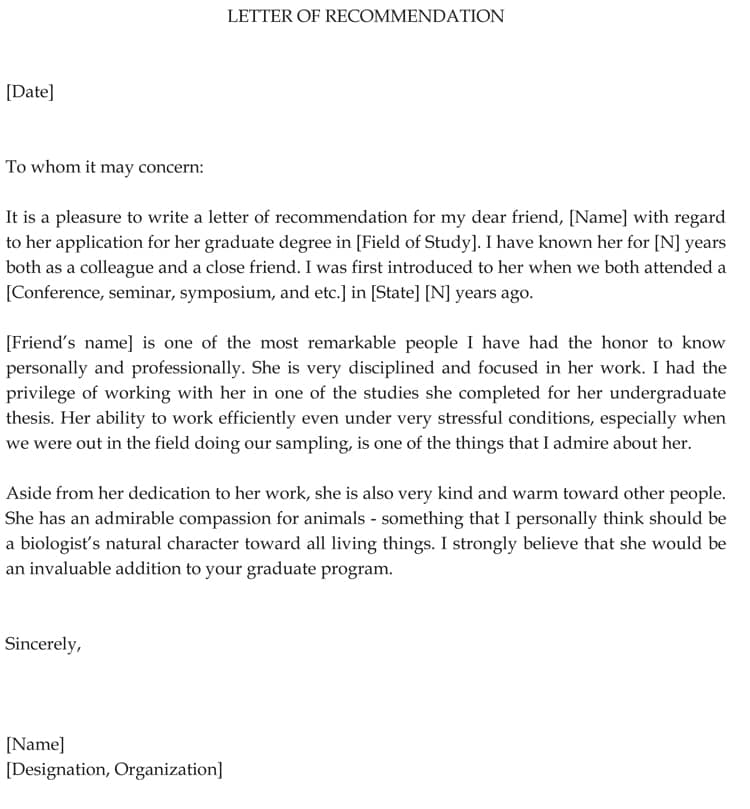
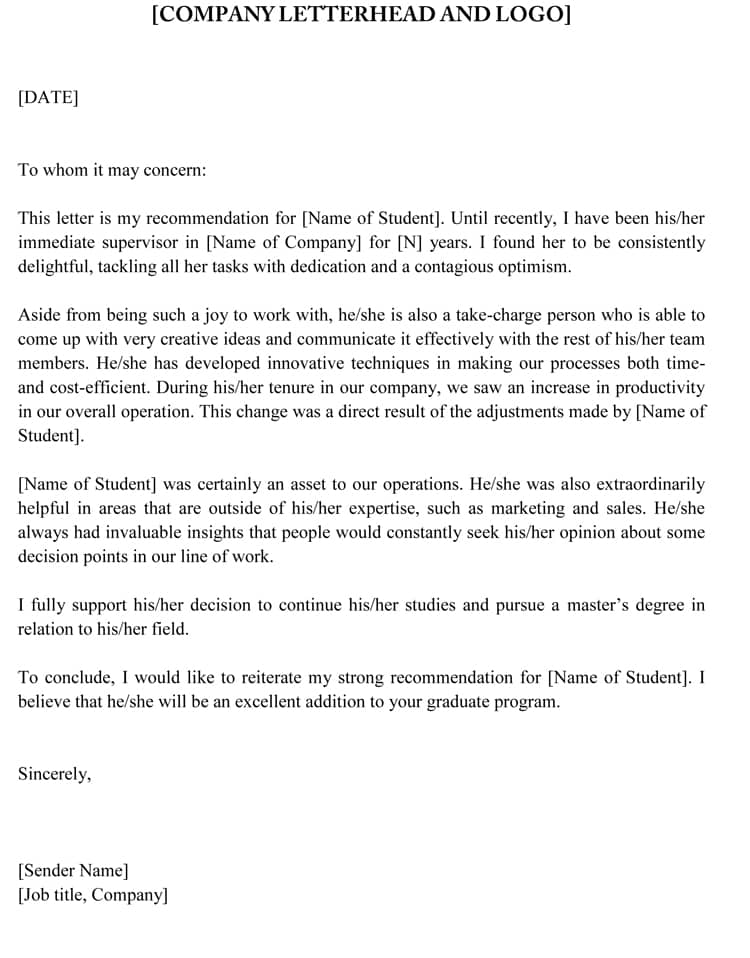
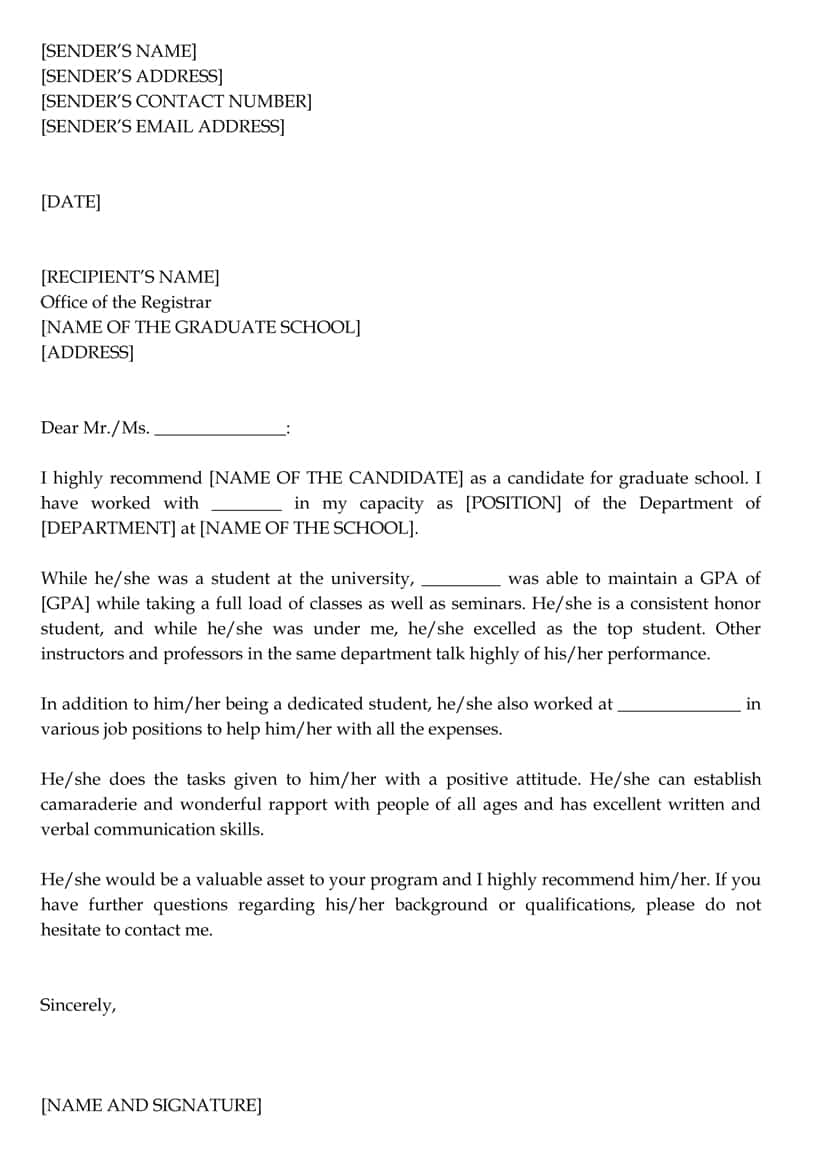
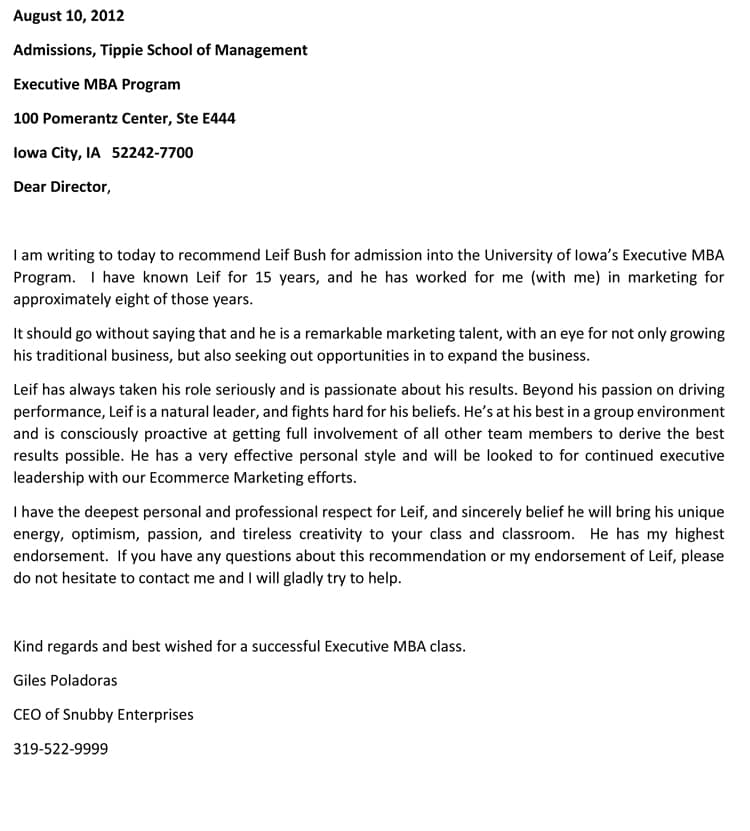
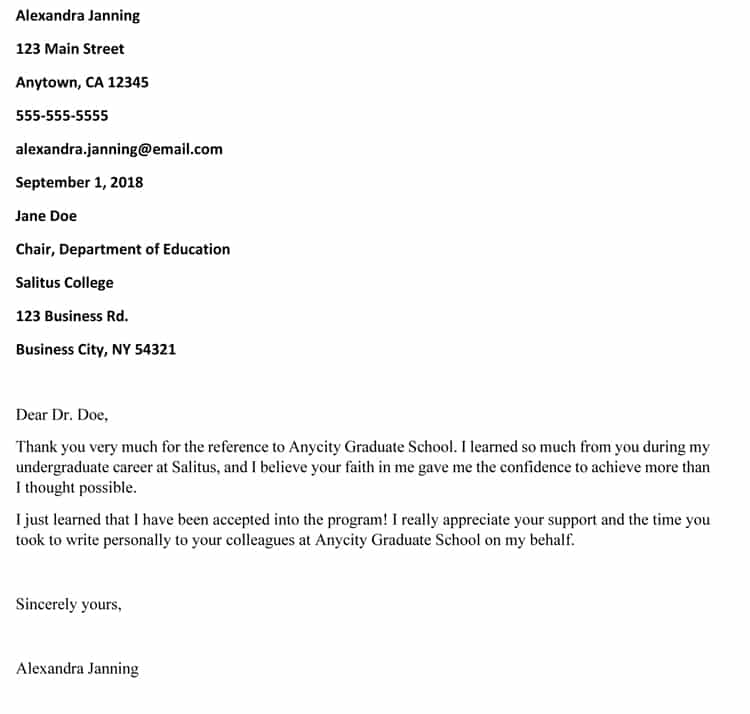
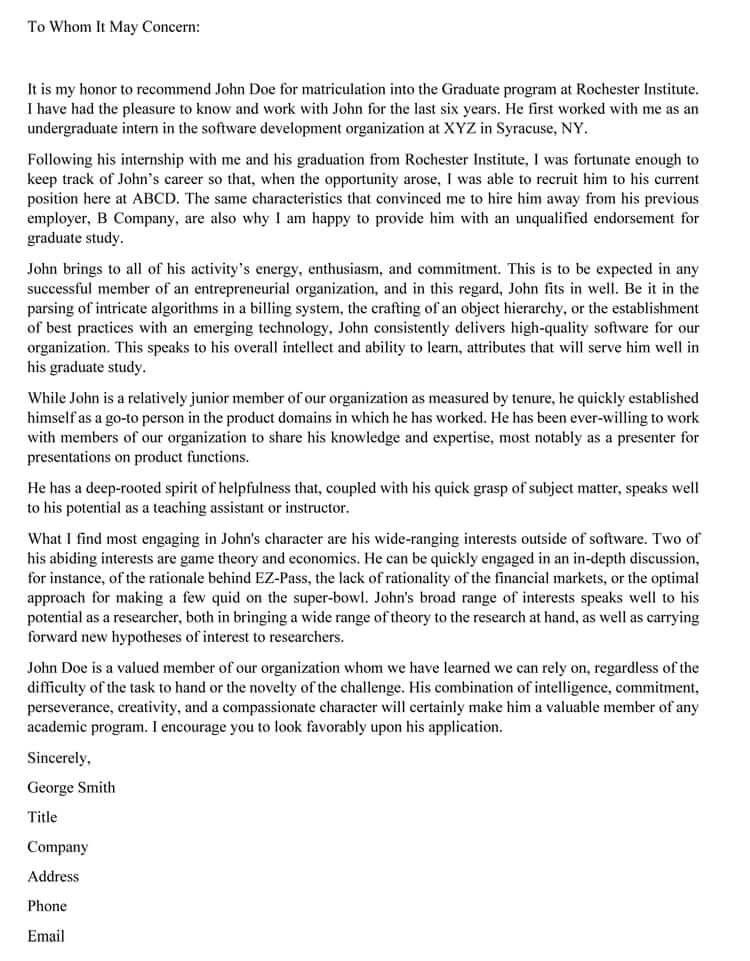
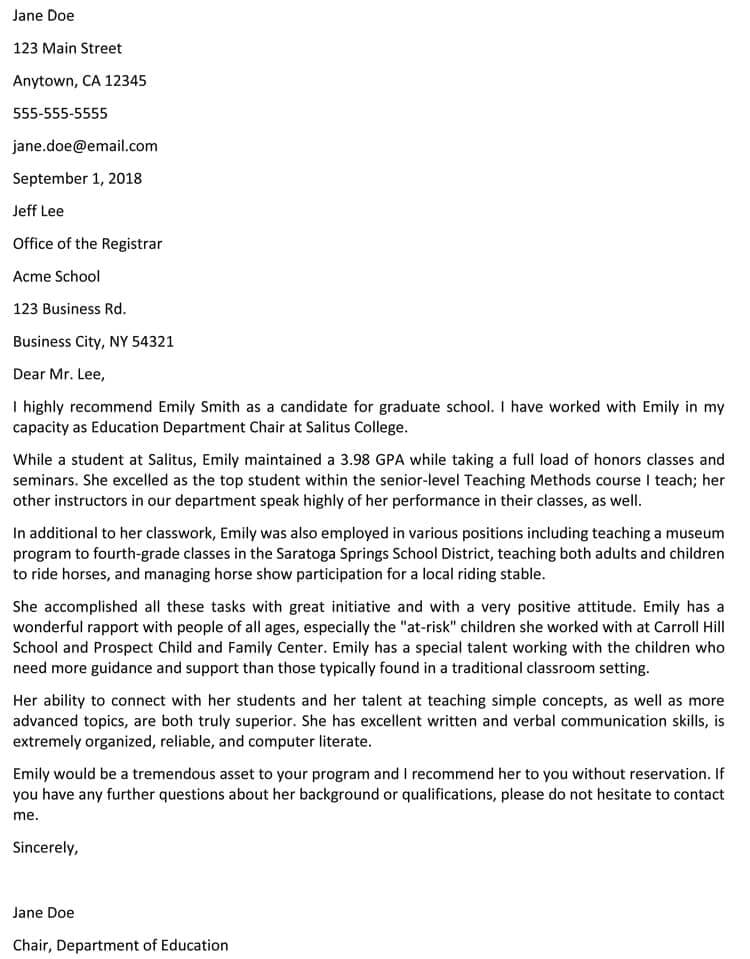
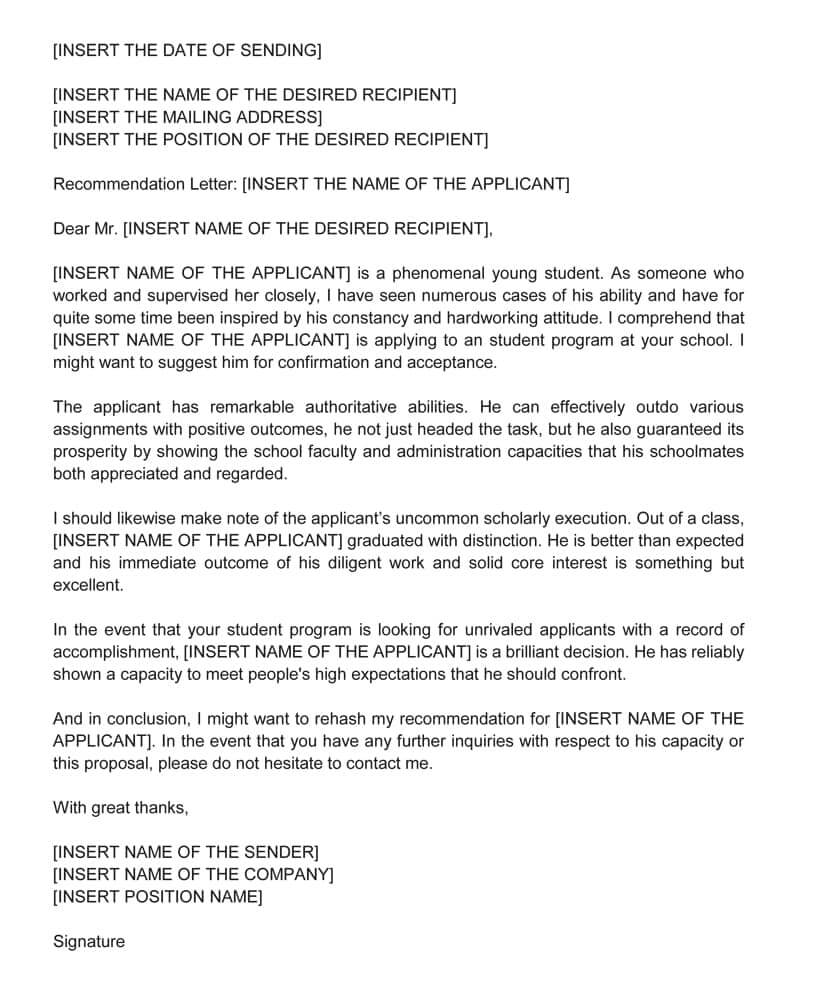
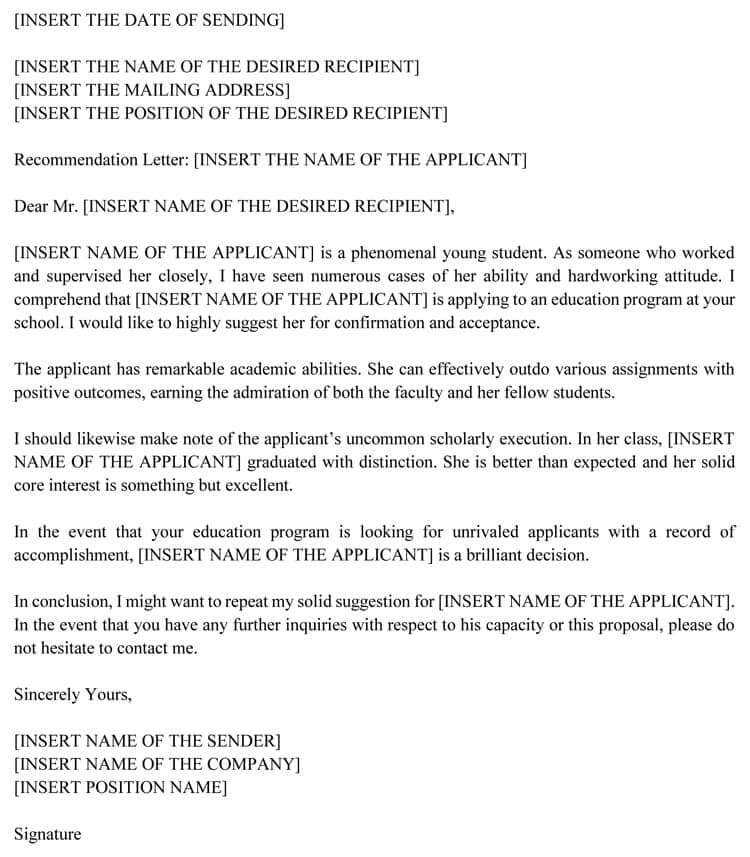
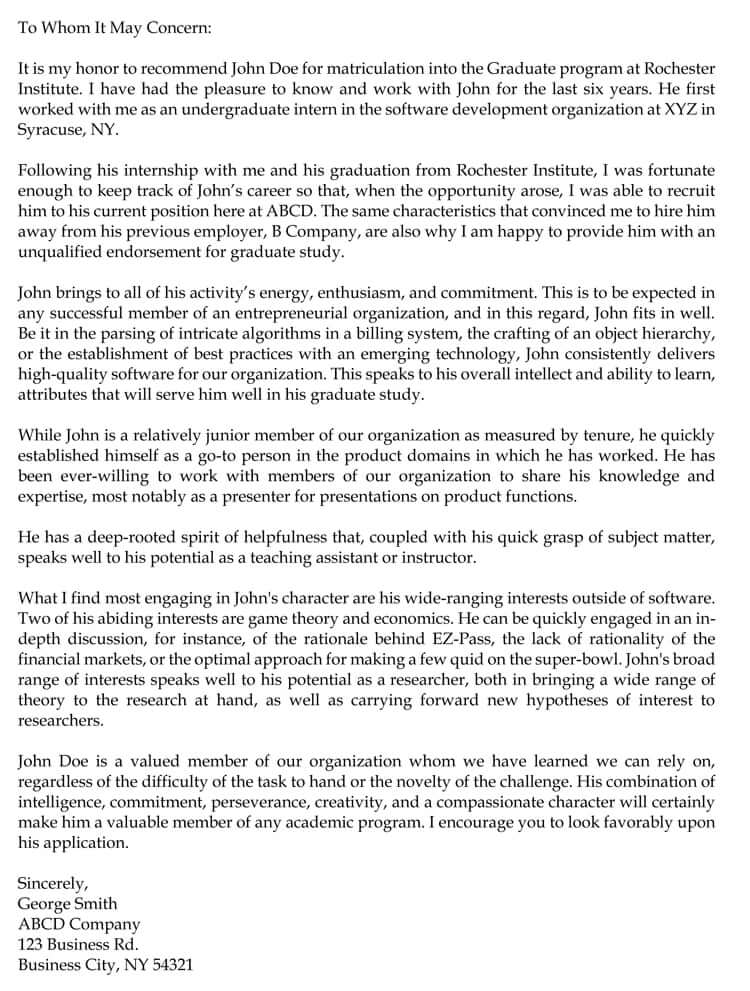
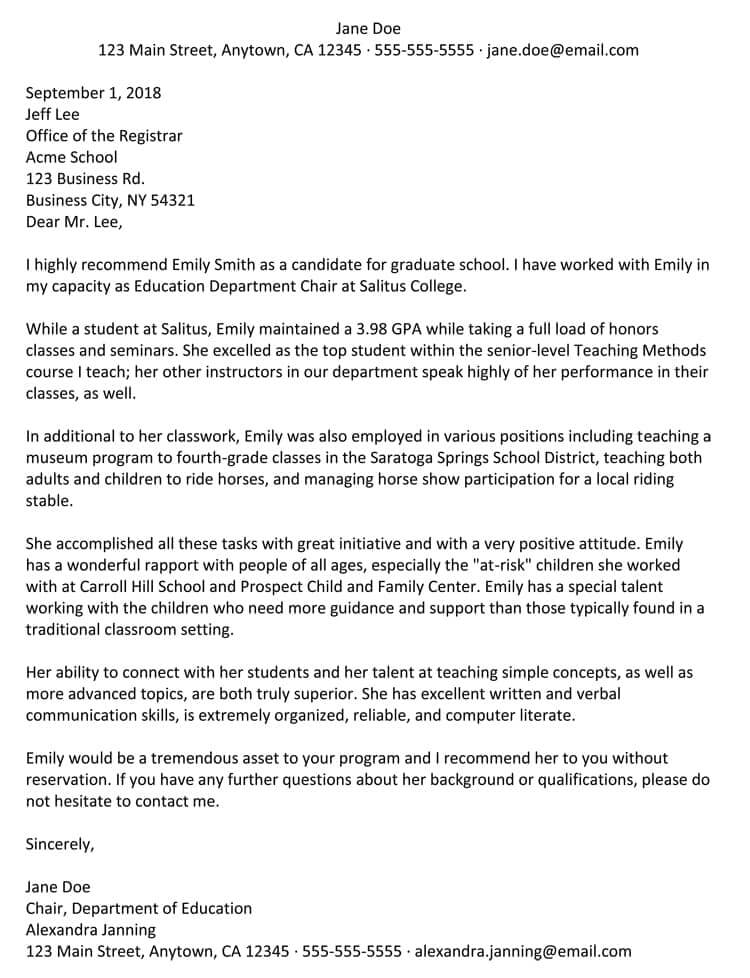
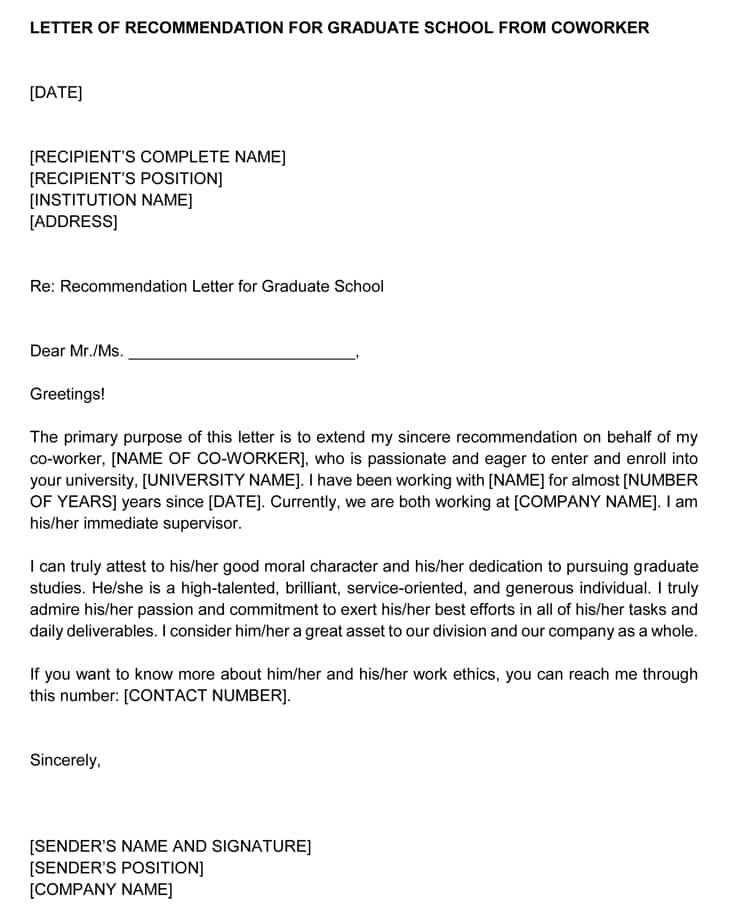
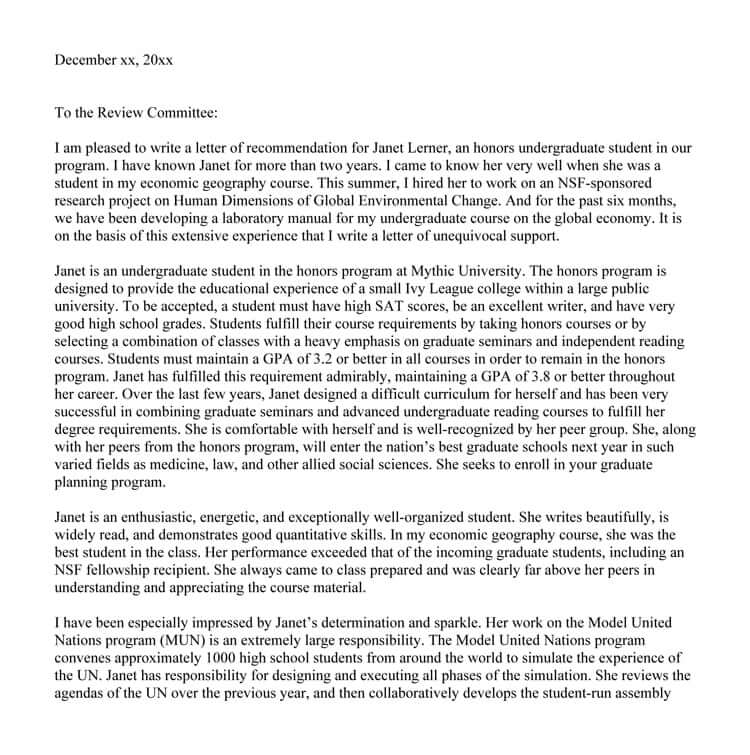
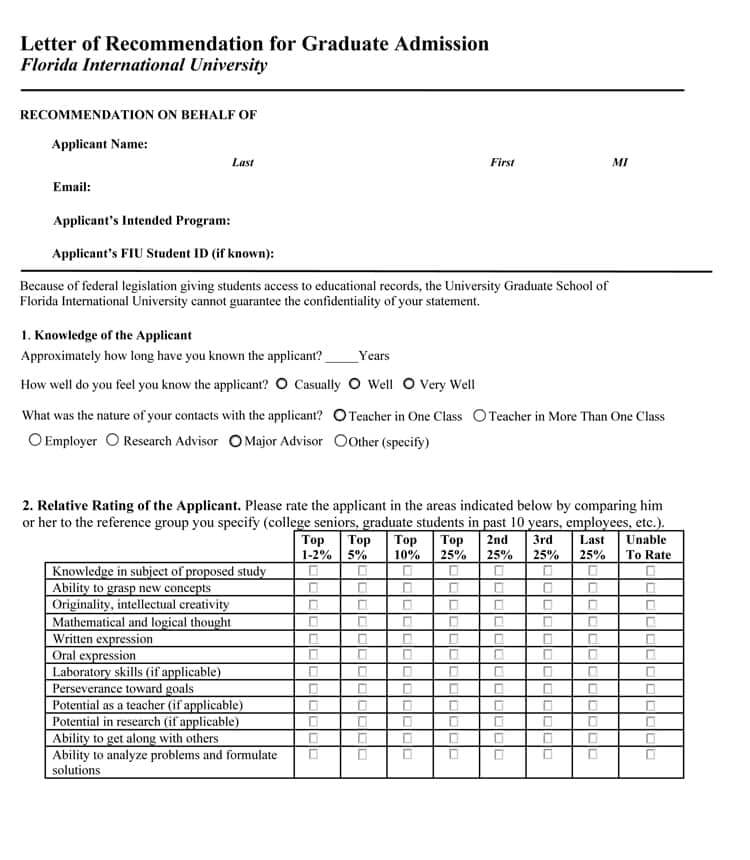
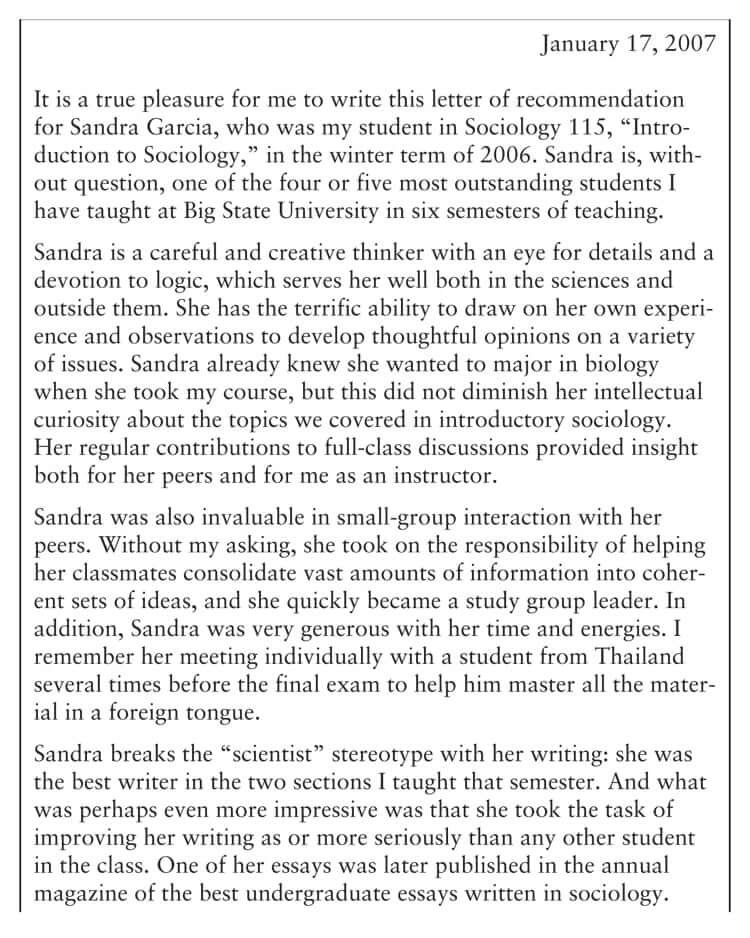
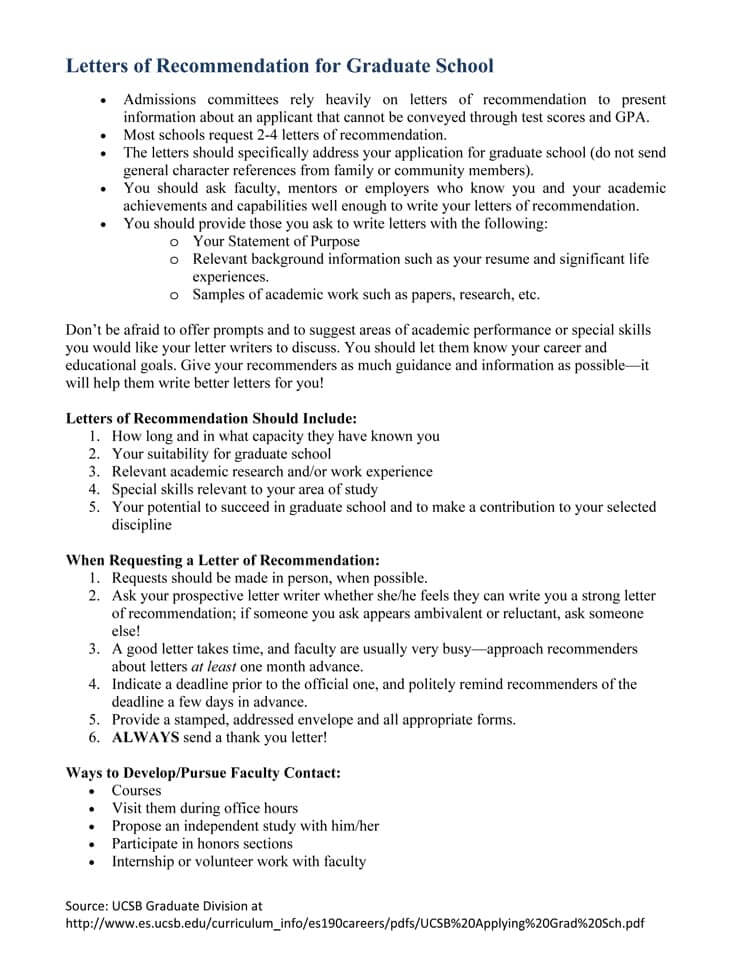
When to Ask for a Letter of Recommendation?
Undergraduate professors and other professionals usually receive countless requests for such letters from other students. To secure an enthusiastic and positive document, you should give your contact plenty of lead time to write it. Ideally, it is a great idea to ask for it at least one month or more before the application deadline.
If your recommender is a college professor, you should also be mindful of their schedule and current state of mind, as crafting such letters takes time. Balancing between planning lectures, advising students, grading college essays, and finding some free time to provide a positive recommendation letter for a particular student can be overwhelming for the professor. Therefore, you should ask for it at the beginning of the semester, rather than mid-semester or towards the end of the semester.
You should also consider asking for it during your professor’s working hours. You should never ask them outside of their office hours, as this may seem unprofessional. You should always ask them in person and be clear about what you ask and how the letter fits your educational and professional goals. If they seem reluctant to write you a positive letter, do not push the matter. Instead, consider requesting another professor who is more than willing to write a positive recommendation for you.
Who to Ask?
Getting the right professor, supervisor, or college advisor to write you this letter can be difficult. These letters play a significant role in helping you get an admission offer. You should consider choosing a recommender who can discuss your abilities, competencies, and personal traits in a coherent way to maximize your admission odds.
The following guidelines will help you know whom to ask for it for graduate school:
Someone who knows you well
Your recommender should be someone you have spent time with within class and outside of the classroom. They should be able to speak about your career goals and aspirations and should hold a favorable opinion of your personal qualities and capabilities.
EXAMPLE
A professor who directs and advises your extracurricular activity club, such as the debate club, volleyball team, etc., can make an excellent reference.
Someone you’ve known for a long time
Reach out to a recommender who has known you for at least one or more years to ensure that the letter impacts the admissions board. The recommender must also hold a current perspective on you. Thus, a teacher from several years ago is not a good choice.
Who is related to the program you are applying for
A college professor who has background knowledge of the discipline or program you want to pursue can make a good reference. This is because they know and can speak to the specific qualities needed to succeed in that course or career line. As a result, the admissions board will trust the individual’s evaluation and perspective of you, and they will be more willing to admit you into the program.
EXAMPLE
A professor at the school granting your undergraduate degree, a professor with the degree you are seeking, a supervisor at a job or internship related to your graduate program, and a professor who has academically evaluated you in a class related to the program can provide good recommendation letters.
Someone who has seen your successes
A person who has witnessed some of your most significant achievements or seen you demonstrate high levels of initiative, commitment, hard work, and teamwork can also provide an effective document. Include specific examples of achievements in the letter. A person who has witnessed your accomplishments can give a first-hand account of what you can do and the value you will add to the graduate program faculty.
An effective communicator
Your recommender should be able to craft a strongly-worded and persuasive letter to convince the admissions board or committee to offer you admission into the desired program. A well-crafted, enthusiastic letter from a college professor may not only get you into a graduate program but may also persuade the department faculty to give you a tuition scholarship or paid employment to help you settle your school fees. Hence, you should always consider recommenders who are more generous, organized, and enthusiastic, and those who can write a memorable letter.
How to Ask for a Letter of Recommendation
While, as an applicant, you cannot control what your recommender writes in the letter or ensure the document is submitted before the application deadline, there are certain things you can do to make the process as successful and efficient as possible. How you ask for it can also impact the quality and type of response you receive from your potential references.
Here is a detailed guide on how to ask for it for graduate school:
Ask in person
Writing it is a big favor. Consequently, your approach to making a request should always be respectful and formal, and you should express gratitude. Asking for such requests in person is usually advocated for, as it helps the recommender gain a deeper understanding of how your motivation aligns with that of the graduate program.
Here are some useful tips for asking for a recommendation in person:
Ask the recommender if they would provide the letter
It is considered standard practice to have a conversation before you submit your written request for a recommendation. This is to ensure that your chosen contact is willing and available to write the letter. Thus, schedule a meeting with your chosen contact and politely ask them if they would be willing to write this letter for you. If they are unwilling or seem reluctant, consider asking another person from your list of potential recommenders.
Arrange a meeting
If the recommender is willing to provide you with a strong recommendation, schedule a one-on-one meeting appointment. This demonstrates that you respect your professor’s time and that you are taking your graduate school application seriously. During the meeting, clarify to your supervisor why you chose them to recommend you and why you value their honest assessment of your academic life and personal qualities. To convince them further, state how your experience and interactions with them have contributed to who you are today, what you have achieved, and, if applicable, how they have influenced your decision to pursue the specific graduate program.
Give a copy of your resume, transcripts, and personal statement
You should provide your recommender with sufficient details and crucial information to enable them to tailor this letter to reinforce your cover letter, personal statement, and resume. Consider giving them a copy of your current resume, copies of your transcripts, your cover letter, personal statement, details of the program to which you are applying, and any other essential information to help them understand your background and interests.
Provide a list of your achievements and abilities
Next, refresh the memory of your recommender by providing them with a list of achievements and abilities that you would like them to highlight in the letter to increase your chances of getting an interview with the graduate school’s admission board.
EXAMPLE
If you are seeking admission into an MBA in a tech-related course, you can request that your recommender highlight your computer-savvy skills, such as programming, and coding, and the awards or achievements you have received in the specific field.
Provide a list of your extracurricular and volunteer activities
Most higher-learning academic institutions prefer candidates who are well-rounded scholars. Therefore, your professor will need to highlight your extracurricular and volunteer activities in the recommendation letter to help strengthen your application. If you have participated in any of these activities, be sure to provide your supervisor with a detailed list of the activities and your relevant accomplishments.
Provide a list of graduate schools you are applying to
If you are applying to various graduate schools, you can provide your recommender with a list of the schools and details of their program to help them customize each letter to the particular school.
Give receiver details
The letter will need to incorporate the recipient’s details. This includes the school’s name, address line, admitting professor’s name, etc.
Give a deadline to submit the letter
The admission board will most likely disregard application materials received after the institution’s stipulated submission deadlines, and this will paint a negative picture of how the admitting team perceives your recommender. It is essential that you give the recommender a deadline to submit the letter to enable them to plan their time well and submit it on time.
Send an email
Although the best way to ask for it is in person, sometimes it might be impossible to meet with your recommender face to face. In such cases, sending a professional email might be considered an appropriate option. However, the email method is only advisable if you know the recommender well enough. However, if you have someone in mind that you haven’t seen or spoken to recently, then it is essential that you meet with them in person to discuss your request.
Essential Elements of a Letter of Recommendation for Graduate School
It will typically cover a range of skills- from academic abilities to research experiences and applied experiences in and out of the classroom.
The letter will generally include the following essential elements:
- A brief description of who the recommender is, why they are qualified to recommend you, and their professional relationship with you
- A description of why the recommender thinks you are the perfect fit for the program, using specific examples and anecdotes to validate their claims
- Specific examples of your greatest accomplishments and personal qualities while in undergraduate school
- A comparison with your peers, i.e., what makes you qualified for the graduate school program over the other qualified applicants
- What the recommender knows about the program or course you are applying to.
Graduate School Recommendation Letter Template
TEMPLATE
[Your Name]
[Your Job Title]
[Your Institution/Organization]
[Institution/Organization Address]
[City, State, Zip]
[Your Email Address]
[Your Phone Number]
[Date]
[Admissions Committee or Specific Person’s Name, if known]
[Graduate Program Name or Department]
[University Name]
[University Address]
[City, State, Zip]
Dear [Admissions Committee or Specific Person’s Name],
I am writing to wholeheartedly recommend [Applicant’s Name] for admission to your [specific graduate program name] at [University Name]. As [Your Relationship to the Applicant, e.g., “their professor for X courses” or “their supervisor at Y organization”], I have had the pleasure of witnessing [Applicant’s Name]’s remarkable growth and academic/professional achievements over the [duration of your relationship with the applicant].
[Applicant’s Name] has consistently demonstrated exceptional abilities in [mention specific skills or areas, e.g., “critical thinking, research, and analytical skills”]. For instance, in [mention a specific project, course, or task], they [describe what the applicant did, highlighting their responsibilities, achievements, and the skills they demonstrated]. This experience showcased not only [Applicant’s Name]’s solid grasp of [mention the relevant subject or field] but also their capacity for [mention important qualities, e.g., “innovative problem-solving and dedication to excellence”].
Beyond [his/her/their] academic prowess, [Applicant’s Name] exhibits qualities that I believe will make [him/her/them] a valuable contributor to [University Name]’s academic community. [He/She/They] is [mention personal qualities, e.g., “a natural leader, highly motivated, and possesses an unwavering commitment to personal and professional development”]. [Provide an example that illustrates these qualities, if possible].
[Applicant’s Name]’s passion for [mention the field or subject] is evident in [his/her/their] [mention any relevant projects, research, or interests]. [He/She/They] has a clear vision for how [he/she/they] plans to use the education and experiences gained from your program to [mention the applicant’s goals or potential contributions to the field].
In conclusion, I have no doubt that [Applicant’s Name] will excel in your graduate program and contribute significantly to your academic community. [His/Her/Their] dedication, intelligence, and work ethic set [him/her/them] apart as an outstanding candidate. I strongly endorse [his/her/their] application and look forward to [his/her/their] continued achievements, which I am confident [he/she/they] will find at [University Name].
Please feel free to contact me at [Your Phone Number] or via email at [Your Email Address] should you require any further information or have any questions regarding [Applicant’s Name]’s application.
Sincerely,
[Your Name]
Letter of Recommendation for Graduate School (Sample Letters)
SAMPLE 01
Dear Members of the Admissions Committee,
I am writing with great enthusiasm to recommend Emily Chen for admission into the Master’s Program in Communication at Prestige University. As Emily’s professor in several advanced communications courses and her academic advisor at City University, I have witnessed her profound commitment to her studies, her exceptional research skills, and her ability to communicate complex ideas with clarity and creativity.
Emily has consistently demonstrated her passion for communications, particularly in digital media and public relations, through her outstanding academic performance and involvement in extracurricular activities. One of her most notable achievements was her capstone project, which focused on the impact of social media on brand reputation. Her research was not only rigorous but also innovative, incorporating a comprehensive analysis of social media trends and their implications for public relations strategies. This project underscored her ability to apply theoretical knowledge to practical challenges, a skill that will serve her well in graduate studies and beyond.
Beyond her academic prowess, Emily exhibits qualities that I believe are essential for success in the field of communication. She is a natural leader, as evidenced by her role as the president of our university’s Communications Club, where she spearheaded initiatives to enhance student engagement and professional development. Her leadership in organizing a successful panel discussion on the future of digital media brought together industry professionals, faculty, and students, facilitating a meaningful dialogue on a topic of great relevance.
Emily’s dedication to her personal and professional development is matched by her genuine desire to contribute to the broader community. She has volunteered her skills to several non-profit organizations, developing social media campaigns that have significantly increased their visibility and impact. Her ability to leverage digital platforms to foster community engagement is just one example of her strategic and empathetic approach to communication.
I have no doubt that Emily will bring the same level of excellence, dedication, and innovation to the Master’s Program in Communication at Prestige University. Her academic background, combined with her practical experience and personal qualities, make her an ideal candidate for your program. I am confident that she will not only benefit from but also contribute significantly to the academic community at Prestige University.
Please do not hesitate to contact me if you require any further information or insights regarding Emily’s application. I am eager to see the contributions she will undoubtedly make to the field of communication and am confident that she will excel in your graduate program.
Sincerely,
Dr. Alicia Ramirez
SAMPLE 02
Dear Admissions Committee,
I am writing to recommend Jordan Lee, a distinguished graduate of University City College, for admission to the Master’s Program in Sociology at Prestige University. As Jordan’s professor in several upper-level sociology courses and supervisor for their undergraduate thesis, I have had ample opportunity to observe their academic rigor, intellectual curiosity, and unwavering dedication to the field of sociology.
Jordan has consistently demonstrated exceptional analytical skills and a profound understanding of sociological theories and methodologies. Their coursework, particularly in areas of social stratification and race relations, has not only been exemplary in terms of academic rigor but also indicative of a deep engagement with the material and a genuine desire to contribute to our understanding of societal dynamics.
One of Jordan’s most notable accomplishments is their undergraduate thesis, titled “Digital Communities and Social Identity,” which explored the impact of online platforms on youth identity formation. This ambitious project showcased Jordan’s ability to conduct comprehensive research, apply complex theoretical frameworks, and communicate findings with clarity and insight. Their work has been recognized as a significant contribution to the department, exemplifying potential for further scholarly research in graduate studies.
Beyond their academic achievements, Jordan has actively contributed to the university community. They served as president of the Sociology Club, organizing events that bridged academic learning with practical social issues, thereby enhancing the intellectual life of the campus. Jordan’s leadership and initiative in these roles have been commendable, demonstrating their commitment to applying sociological insights to effect positive change.
Jordan’s passion for sociology is matched by their compassion and empathy towards others. They possess a unique ability to understand diverse perspectives, making them not only an outstanding student but also a valued member of any academic community. Their ethical approach to research and dedication to social justice are qualities that I believe will serve them well in graduate studies and beyond.
I have no doubt that Jordan will excel in the Master’s Program in Sociology at Prestige University. Their intellectual curiosity, combined with a solid foundation in sociological research and theory, makes them an ideal candidate for your program. I strongly endorse their application and am confident that Jordan will make significant contributions to the field of sociology.
Please do not hesitate to contact me if you require any further information or insights regarding Jordan’s qualifications and character.
Sincerely,
Dr. Emily Thompson
Associate Professor of Sociology
University City College
Key Takeaways
The sample recommendation letters provide thorough endorsements of the candidates’ academic achievements, personal qualities, and potential contributions to their respective fields. Both letters are effective for several reasons:
Strong Academic Endorsement: Both letters provide a comprehensive overview of the candidate’s academic achievements, highlighting their exceptional performance in relevant courses, research projects, and extracurricular activities. This demonstrates the candidates’ academic aptitude and dedication to their field of study.
Specific Examples: Each letter includes specific examples of the candidate’s accomplishments and contributions, such as capstone projects, thesis titles, and leadership roles. These concrete examples provide evidence of the candidates’ skills, knowledge, and potential for success in graduate studies.
Personal Qualities: The letters also touch upon the candidates’ personal qualities and character traits, such as leadership, empathy, and dedication to social justice. This holistic view of the candidates helps the admissions committee assess their suitability for the program and their potential to contribute positively to the academic community.
Professional Tone: Both letters maintain a professional tone throughout, with clear and concise language used to convey the writer’s endorsement of the candidate. This professionalism enhances the credibility of the recommendations and reflects positively on the candidates.
Endorsement of Fit: Each letter explicitly states the writer’s confidence in the candidate’s suitability for the Master’s Program at Prestige University, emphasizing their academic background, personal qualities, and potential for further scholarly research. This endorsement of fit strengthens the candidates’ applications and aligns with the admissions committee’s criteria for selection.
Overall, these recommendation letters effectively advocate for the candidates’ admission to the Master’s Program at Prestige University by providing a thorough and compelling endorsement of their academic achievements, personal qualities, and potential for success in graduate studies.
Tips for Getting an Impressive Recommendation Letter
To get a strong and positive letter from your selected recommenders, consider the following useful tips:
Give your recommender ample time to write the letter
If you ask your college professor to write you this letter right away, they may be unwilling to accept the offer, or they most likely will provide a recommendation that does not strongly endorse your candidacy, which is worse than no recommendation at all. As such, a few weeks’ notice before the application deadline date is considered sufficient to write a detailed, impactful letter.
Choose the best from all your recommenders
When asking for it from someone, you must choose the right person. Someone who knows you well enough to vouch for your candidacy can be persuasive enough to encourage the admissions board to offer you an opportunity at their school.
You will also want to consider someone who can speak to your specific strengths and describe how these strengths will serve you well in the graduate program, rather than a recommender who will simply write a letter that states specific skills with no supporting evidence. Admissions committees want to know how you would benefit their program, so you want reference letters that will help bring that to life.
Shape your letter
Most recommenders tend to create generic letters for all the students, and then customize them before submitting them to the graduate faculty program. Such letters usually don’t help the student stand out from the competition. You can avoid this by providing your recommender with all the necessary information to craft a strong letter and asking them to emphasize certain things in the letter
EXAMPLE
Specific skills, relevant accomplishments, or unique circumstances you overcame to succeed as an undergraduate.
Waive your right to review the letter
These letters are supposed to be sent to the admission board without the student reviewing them. While it might be tempting to want to know what your recommender wrote about you, it is essential to waive your right to review the letter to encourage the recommender to provide a more candid document. Besides, the admissions board will know your writers felt free to objectively assess your academics, making the letter more impactful.
Be organized
For your recommender to provide the most comprehensive letter, you need to provide them with as much information on the qualifications that make you suitable for the program as is necessary. You can provide them with your application documents, such as your resume, academic transcripts, your achievements, research experience, internships, experiences you’ve shared with them, and academic and career goals, as well as all the information that the recommender may need to plan the writing promptly and target the letter as much as possible. You also need to foster relationships with potential referees and request recommendations early enough to avoid last-minute rushes and unwillingness from potential recommenders.
Thank your recommender
Regardless of the result of your application to a graduate school, you should always inform your recommenders of the outcome. A well-written thank-you letter, email, or card, expressing your gratitude for the recommender’s help is considered appropriate. This is important as it encourages the professor to provide you with future reference letters when the need arises.
Frequently Asked Questions
Generally, these letters should be written by someone who knows you well academically. Faculty members, research supervisors, and undergraduate academic advisors are often the most qualified to provide such letters. However, other professionals, such as an employer who has known and supervised you for at least six months and above, can also provide a strong letter. However, the employer must have specialized in a program related to the course you are applying for or work in a field related to the course you want to pursue.
It should always be written in more than two paragraphs. Anything less than two shows that you have no clue what the person’s academic performance is overall and that you don’t know much about them.
Although you don’t want to write less than two paragraphs, you should also avoid writing more than one page because you want to keep it on point and be focused on only a few key points.
In it, you essentially include a comprehensive summary of the individual’s achievements and academic performance. The only difference in writing this letter is that this particular letter is only well written by a professor at a college or university.












